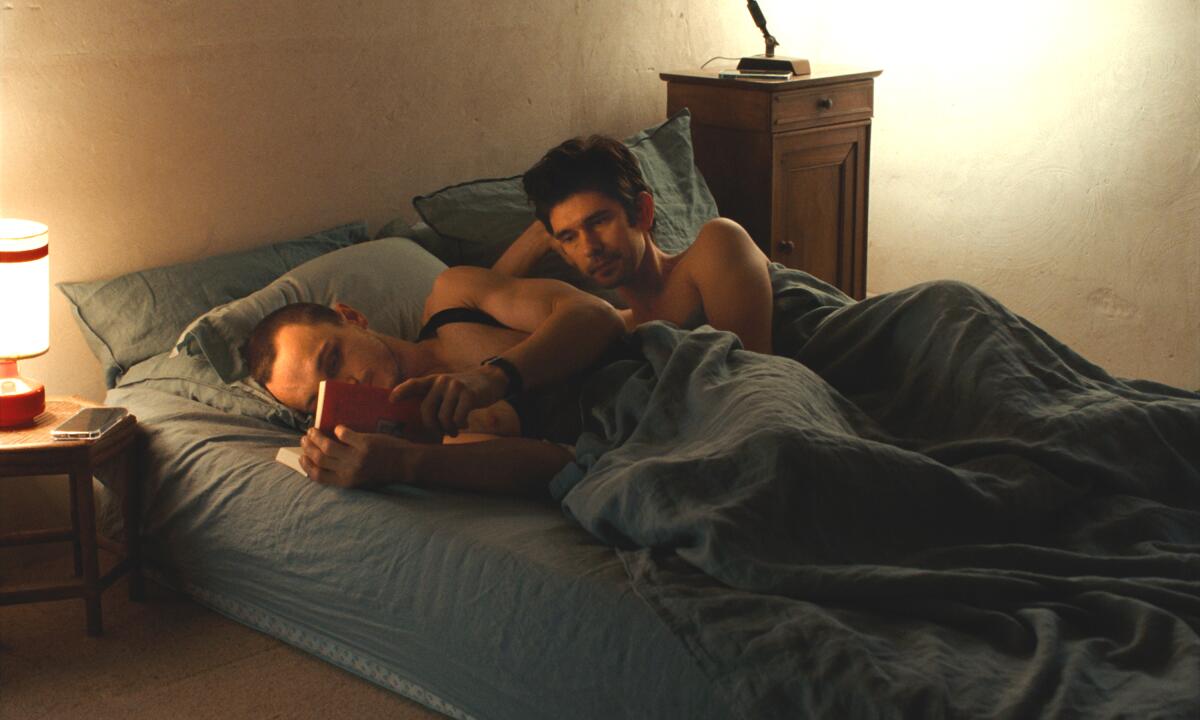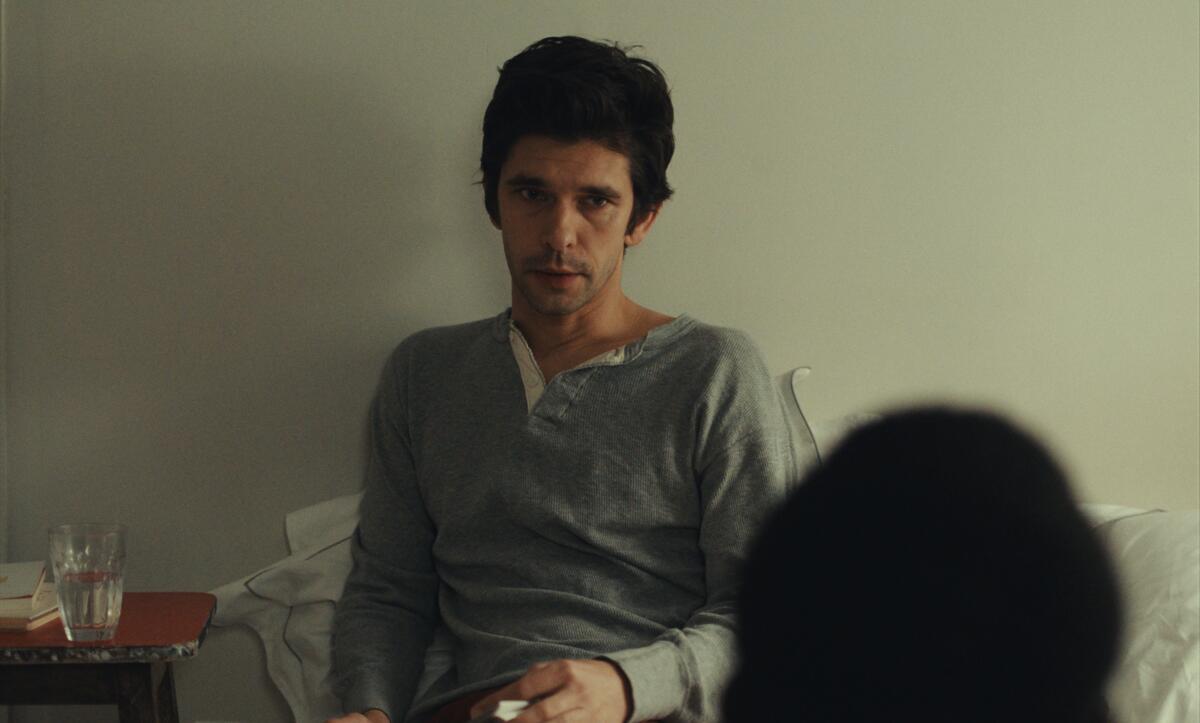Sundance sensation ‘Passages’ gets an NC-17 rating. Its director calls that ‘censorship’

- Share via
The upcoming film “Passages,” directed and co-written by Ira Sachs, has received a rare NC-17 rating from the Motion Picture Assn., the Los Angeles Times has exclusively learned. A decision has been made by the project’s partners to release the film unrated.
The movie premiered this year at the Sundance Film Festival and will have its Los Angeles premiere Thursday as the centerpiece screening at Outfest. “Passages” will open in Los Angeles and New York on Aug. 4 before expanding to more cities in the weeks after.
In an interview with The Times, Sachs said that there was never any consideration given to cutting the film to appease the ratings board for an R.
“There’s no untangling the film from what it is,” said Sachs. “It is a film that is very open about the place of sexual experience in our lives. And to shift that now would be to create a very different movie.”
The Paris-set drama traces a love triangle between Tomas (Franz Rogowski), a movie director, Martin (Ben Whishaw), a print-maker, and Agathe (Adèle Exarchapoulos), a grade-school teacher. Tomas and Martin have long been a couple when the former decides to embark on a relationship with Agathe, his actions tearing through all three of their lives like a wrecking ball. The evolving dynamics of the relationships are explored, in part, through a number of sex scenes.

The film, which has thus far been well-received, is being distributed by Mubi, the smartly curated streaming service that has also released such titles as last year’s “Decision to Leave,” directed by Park Chan-wook. In a statement emailed to The Times, Mubi said the company was “deeply disappointed” by the NC-17 rating.
“‘Passages’ is an honest and groundbreaking portrait of contemporary relationships, both queer and straight,” the Mubi statement reads. “Frank and thoughtful portrayals of sex are essential to cinematic storytelling and in service of representation more broadly. An NC-17 rating suggests the film’s depiction of sex is explicit or gratuitous, which it is not, and that mainstream audiences will be offended by this portrayal, which we believe is also false.”

The NC-17 rating — no one under 17 admitted, even with a parent or guardian — was created in 1990 with the hopes it would differentiate between movies made for adult sensibilities and outright pornography. The first film released with the designation was Philip Kaufman’s “Henry & June,” but any commercial prospects for its use by Hollywood studios were derailed by the time of the box-office failure of Paul Verhoeven’s “Showgirls” in 1995.
Since then, films have occasionally accepted the rating, such as Steve McQueen’s “Shame” and the Exarchapoulos-starring “Blue Is the Warmest Color,” but distributors have largely avoided it. Other films given an NC-17 have opted — like the team behind “Passages” — to reject the rating and go unrated, such as Todd Solondz’s “Happiness” and Darren Aronofsky’s “Requiem for a Dream.”
Earlier this year, Brandon Cronenberg’s “Infinity Pool” received an NC-17 but was recut for an R rating. Last year’s Marilyn Monroe biopic “Blonde” became the first Netflix original film to earn an NC-17, and was only the second NC-17 film to be released at all since 2015.
Sachs’ 2012 film “Keep the Lights On,” about a relationship between two men in which one is struggling with drug addiction, was released unrated. The director’s 2014 film “Love Is Strange” starred John Lithgow and Alfred Molina as a couple in a long-term relationship who decide to get married. It received an R rating for language.
Sachs, who believes “Love Is Strange” received its R rating unfairly, says he was further dismayed when “Passages” got an NC-17. He called the choice to release the film unrated (rather than either going out with the NC-17 or making the cuts to secure an R rating) a “collective decision” with Mubi, “based on our desire for the most people possible to have a chance to see the film” in its intended form.
Additionally, Sachs had pointed criticism for the ratings board itself: “It’s so 1950s that this still exists,” the filmmaker said.
“We’re talking about a board that is not visible, that doesn’t make its rules known, that exists in silence,” Sachs added, referring to “This Film Is Not Yet Rated,” the 2006 documentary about the movie ratings system, directed by Kirby Dick. “We’re talking about a select group of people who have a certain bent, which seems anti-gay, anti-progress, anti-sex — a lot of things which I’m not.”
Asked for comment, a Motion Picture Assn. spokesperson denied that films with gay themes and images of gay sex are rated differently from those depicting heterosexual relationships, saying in a statement to The Times, “The MPA’s Classification and Rating Administration rates movies based on their content — what happens on screen and how it is depicted. The sexual orientation of a character or characters is not considered as part of the rating process.”
As to how the ratings board communicated which images or moments caused the rating decision, Sachs recalled, “I think we got something that looks like it was written by my great-aunt. In this case, it was about ass and fingers and bodies in motion. And it’s very funny, because it’s written by someone who seems to be literally from a different era.”

Evidently central to the film’s NC-17 rating is a sex scene between Whishaw and Rogowski. Shot in a single unbroken take that lasts a little over two minutes, the scene shows Whishaw’s bare back and buttocks, his body obscuring Rogowski beneath him.
“I’m just so happy that that scene was as strong and powerful as it seems to be, because that was my intention,” said Sachs, “which was to have a moment in the film in which we don’t hide from the impact of sex on our lives and what it means to us as individuals.”
In preparing to make “Passages,” Sachs said he watched films by celebrated directors Pier Paolo Pasolini and Chantal Akerman, as well as contemporary French cinema, because, as he put it, “I needed to be reminded that the body was not off-limits to cinema.”
“To make an interesting sex scene is not easy,” said Sachs. “Each of the sex scenes to me is a chapter in the film. It has a story. And I wanted each one to have its own relevance and have its own details and be interesting to the audience. I think making interesting sex scenes is the hardest thing.
“What I tried to track here was to not look at sex, but to look at intimacy,” Sachs added, “not constructed through editing and avoidance.”

As Mubi prepares the film for release in its uncut form, Sachs is still hopeful it can be seen by the broadest possible audience, despite his dissatisfaction with the MPA’s decision.
“We hunger for movies that are in any proximity to our own experience,” said Sachs, “and to find a movie like this, which is then shut out, is, to me, depressing and reactionary. It’s really about a form of cultural censorship that is quite dangerous, particularly in a culture which is already battling, in such extreme ways, the possibility of LGBT imagery to exist.”
Sachs said he also presented “Passages” to a different sort of ratings board — his mother.
“She thought it was quite hot, to be honest,” the director said. “Which I wasn’t sure would be her response.”
More to Read
Only good movies
Get the Indie Focus newsletter, Mark Olsen's weekly guide to the world of cinema.
You may occasionally receive promotional content from the Los Angeles Times.










